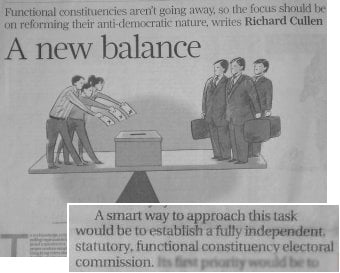To no-one’s great surprise, High Court Judge Andrew Cheung Kiu-nang rules that Hong Kong’s Basic Law does not bar non-humans from voting in elections. The inert entities concerned are companies and other organizations that currently have the right to cast ballots for (human) candidates running for functional constituency seats in the Legislative Council. (In practice, a warm, breathing, flesh-and-blood chairman or chief executive exercises the right, though many of these races for seats representing very small franchises are uncontested.)
This is the result of a judicial review sought by the League of Social Democrats, everyone’s favourite radical trouble-makers. Abolishing corporate voting is viewed as a relatively minor but essential step in making the functional constituency system more democratic and thus reducing the political clout of particular business interests. Certain tycoons register numerous companies in order to wield multiple votes, and they make sure that serving or hopeful legislators know it.
The government, in its low-key public consultation on proposed non-changes to the political structure for elections in 2012, asks us:
Do you agree that the method of replacing “corporate votes” with “director’s / executive’s / association’s / individual votes” should not be adopted?
To which the correct answer is, of course, “Yes, I really want non-humans to continue having votes, if that’s what you’re trying to say.”

Yesterday’s South China Morning Post featured an article by HK University visiting law professor Richard Cullen arguing that for various reasons the democratization and ultimate removal of functional constituencies will have to take place in phases. He then says:
A smart way to approach this task would be to establish a fully independent, statutory, functional constituency electoral commission.
How touching it is to know that naïve, dreamy idealism is alive and well in the ivory towers up at Pokfulam!
The professor overlooks one crucial fact here, and that is that our supreme sovereign power is the Chinese Communist Party, and they do not do independent, statutory, functional constituency electoral commissions – in fact, they don’t do independent anything.
Beijing insists on us having easily manipulated functional constituencies specifically to ensure that we do not have an independent legislative branch. That won’t change; it cannot, in a one-party state where no possible rival source of political power is permitted.
Similarly, we do not have ultimately independent courts. As we have seen with the various ‘interpretations’ of the Basic Law since 1997, Beijing can overturn the Hong Kong judiciary’s decisions simply by declaring that the law means something different from what is written. Whatever the specific arguments in the High Court judicial review on non-human voters, Judge Andrew Cheung surely knew there was no point in bothering to go there.

well you already, at great lengths, that we should turn our focus on attempting to break the oligarchial structure rather than using the same pre-1997 methods to strive for more democracy in hk, which i wholeheartedly agree with.
the definition of insanity is trying the same thing over and over again and expecting different results.
having said that, since the ccp wont make the functional constituencies go away, why dont we try to reform them to make it more patten-like? this is something we havent seriously tried before.
or are you suggesting that we try nothing new with respect to democratic reform because they’re gonna be meaningless anyways?
RESISTANCE IS FUTILE.